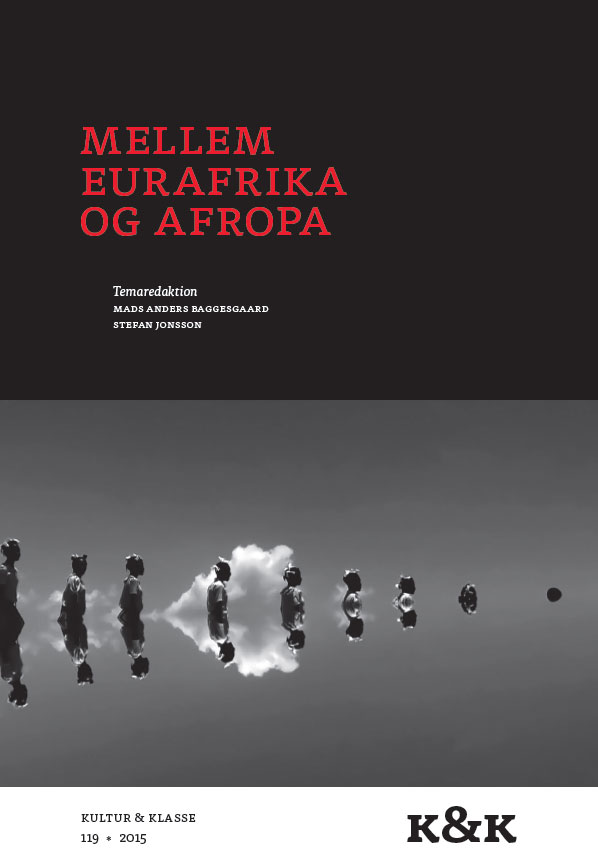Tavshedens terror - Assia Djebar, Derrida og Algeriet
DOI:
https://doi.org/10.7146/kok.v43i119.22248Keywords:
Jacques Derrida, Assia Djebar, Algeria, cultural identity, writing, bilingualism, nationalism, recollection, postcolonialism, autobiographyAbstract
Born in Algeria, but educated in the French educational system, Derrida and Djebar both write from a slippery position of in-betweenness, explicitly relating their understanding of language and culture to their problematic, French-Algerian identity.
Djebar’s novel, So Vast the Prison, is driven by a desire to hear the beloved, silenced voices of her ancestors, but nevertheless radically opposes the idea of a self-sufficient Algerian identity that has been lost and needs to be salvaged. In Djebar, to track down history is rather like exposing a wound; to realize that the break with the past is unmendable. In keeping with Derrida’s Monolingualism of the Other, the retrospection of So Vast never reaches behind the bilingual condition, suggesting that the colonized is always already entangled in the colonizer.
Paradoxically, So Vast presents the colonizer’s silencing of the Algerian people not as the hindrance to, but as the very precondition for liberation, as traces of a Derridean, radically other language resonate from the muffled voices trapped inside the French. Gaining their strength precisely by having no voice and no place, they terrorize the official culture from within, indefatigably destabilizing those phantasms and ideologies that claim to inhabit an unsplit tongue. The Franco-Maghrebian position thus offers a welcome chance of revealing the arbitrariness of the existing law, potentially deconstructing the truth claim of any system.
References
Ahluwalia, Pal. ”Derrida”. Out of Africa. Post-structuralism’s Colonial Roots. New York: Routledge, 2010. 73-103.
Bensmaïa, Réda. Experimental Nations. Or, the Invention of the Maghreb. Princeton: Princeton University Press, 2003. 11-26.
Budig-Markin, Valérie. ”Writing and Filming the Cries of Silence”. World Literature Today: A
Literary Quarterly of the University of Oklahoma 70:4 (1996): 893-904.
Derrida, Jacques. ”La mythologie blanche. La métaphore dans le texte philosophique”. Marges de la philosophie. Paris: Les Éditions de Minuit, 1972. 247-324.
Derrida, Jacques. Le monolinguisme de l’autre ou la prothèse d’origine. Paris: Galilée, 1996.
Derrida, Jacques. Force de loi. Le ”Fondement mystique de l’autorité”. Paris: Galilée, 1994.
Derrida, Jacques. ”Taking a Stand for Algeria.” Acts of Religion. Red. Gil Anidjar. New York: Routledge, 2002. 299-308.
Djebar, Assia. Vaste est la prison. Paris: Albin Michel, 1995.
Donadey, Anne. ”The Multilingual Strategies of Postcolonial Literature: Assia Djebar’s Algerian Palimpsest.” World Literature Today: A Literary Quarterly of the University of Oklahoma 74:1 (2000): 27-36.
Flores, Andrea. ”Ruin and Affect in Assia Djebar’s Vaste est la prison”. Alif: Journal of Comparative Poetics 20 (2000): 234-56.
Green, Mary Jean. ”Assia Djebar in the Twenty-First Century: Rewriting Identities”. Contemporary French and Francophone Studies 17:1 (2013): 49-57.
Rice, Alison. ”Francophony? Legitimacy, Authenticity, and Integrity in French Literature”. Time Signatures. Contextualizing Contemporary Francophone Autobiographical Writing from the Maghreb. Lanham, MD: Lexington Books, 2006. 1-34.
Spivak, Gayatry Chakravorty. ”Acting Bits/Identity Talk”. Critical Inquiry 18:4 (1992): 770-803.
Zimra, Clarisse. ”Afterword” (et interview med Assia Djebar). Women of Algiers in Their Apartment. Assia Djebar. Charlottesville: The University Press of Virginia, 1992. 159-211.
Downloads
Published
How to Cite
Issue
Section
License
Tidsskriftet følger dansk ophavsret.





